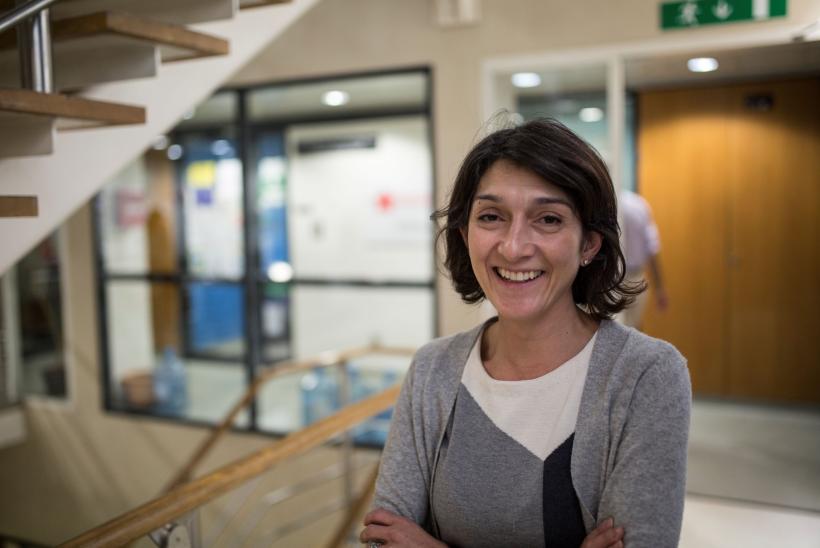New clinical trial at GOSH gives hope to children with aggressive blood cancer
Researchers at GOSH and UCL Great Ormond Street Institute of Child Health (UCL GOS ICH) are collaborating on a novel approach to clinical trials to give hope to children with an aggressive type of blood cancer, T-cell acute lymphoblastic leukaemia (T-ALL).
Dr Sara Ghorashian, a Consultant Haematologist at GOSH, and her team will be running a trial for young people whose T-ALL relapses or is resistant to conventional treatments, including chemotherapy and bone marrow transplant. There is currently no standard of care for these children, and long-term survival can be as low as 30%.
As well as potentially providing a new treatment option for children and young people with relapsed T-ALL, the trial is also adopting a novel approach which will see it running alongside an adult’s clinical trial - taking place at University College London Hospital (UCLH) - for the first time in the hope of creating a more efficient trial design.
Dedicated research projects for children’s cancers are rare, with paediatric clinical trials traditionally starting later than adults’ and taking an average of six and a half years longer to complete. Only 12 anti-cancer medicines have been authorised for paediatric cancer specifically in the last ten years, compared to over 150 for adult cancers.
How will the trial work?
The phase 1 clinical trial will treat 12 children with relapsed T-ALL. It will be testing the effectiveness of a CAR T-cell therapy targeted at a specific protein called CCR9, that has been newly identified by researchers at UCL to occur exclusively on cancerous T-cells. Through the trial, Dr Ghorashian and her team are hoping to develop a new treatment that is more effective and targeted than current options.
CAR T-cell therapy, which involves genetically modifying the body’s immune cells to recognise and kill cancer cells, has already shown remarkable success in children with B-cell acute lymphoblastic leukaemia. However, this has proven difficult to replicate in T-ALL due to the CAR T-cells targeting either each other or the healthy T-cells, weakening the immune system even further. However, with the recent discovery of the CCR9 protein, there is now a promising, clearer target.
With the required funding in place, the trial is now going through all the necessary reviews and approvals with the expectation that it will be open in early 2025.
Any patients eligible to receive treatment under the NHS and interested in this trial should approach their specialist healthcare provider. In the interim, clinical teams will be happy to discuss alternative trials that are currently open for children with T-ALL.
Ensuring Equal Access to Life-Saving Therapies for All Ages
Not only will this new trial design potentially result in significant time-savings and cost, but it will also help ensure that children and adults have access to targeted therapies at the same time on the NHS. This will be a change from traditional clinical trial methods where adults take part first, which can mean that children don’t even get the opportunity to try these potential treatment options if the trial fails in adults. This is particularly pertinent as children and young people often tolerate CAR T-cell therapy more robustly than adults.
Dr Sara Ghorashian, Consultant Haematologist at GOSH and Honorary Associate Professor at UCL, said:
“Too often, children wait unacceptable amounts of time to access new cancer treatment which could make all the difference. This study will pave the way for research to always include children and make it a matter of course that both children and adults are incorporated within clinical trials at the same time. Our goal is to never have a situation where children are left behind and we hope that we can prove the benefit of this novel approach to influence a change in the law in the future.”
New Children’s Cancer Centre will help improve treatments
Our new Children’s Cancer Centre (CCC) will mean that children with rare and complex cancers will receive care in the best possible environment, making it easier for them to be able to play, continue with school and participate in normal activities. The CCC will also enhance our ability to research and innovate to develop new and kinder treatments for cancer.
With significant outside space, a new hospital school, child centre inpatient wards and day care spaces, imaging, theatres and critical care services linked to the existing hospital, children and young people coming to GOSH will have access to the very latest technologies and receive care and treatment in environments that reflect their needs.
For more information about the CCC and how you can support, visit the Great Ormond Street Hospital Charity website.


